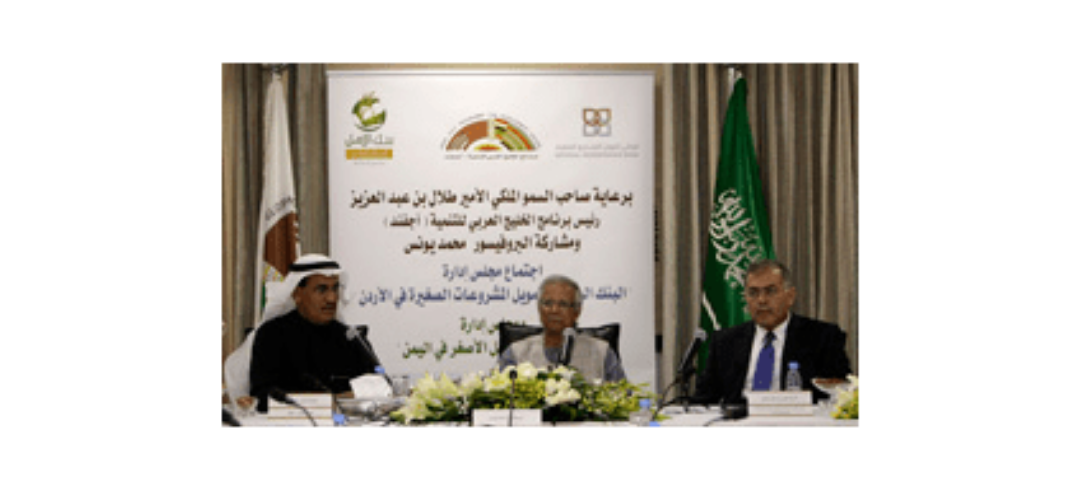News

AGFUND Banks for the poor examine plans for reducing the consequences of “Yemen Events” on its clients
The banks for the poor that have been established by the Arab Gulf Program (AGFUND) for Development have started in cooperation with its partners from the private Arab sector in studying some plans in order to reduce the consequences of the exceptional circumstances through which some Arab countries pass on its clients from the poor category. This was brought up in the first joint meeting for the board of Al-Amal microfinance bank in Yemen and the board of Al-Watani bank for financing small projects in Jordan. The meeting which was held at AGFUND’s main headquarters on Thursday, January 12, was under the presidency of professor Mohamed Yunus the strategic partner of AGFUND in establishing banks for the poor in the Arab world, who was setting in for Prince Talal Bin Abdulaziz. This meeting witnessed the participation of businessmen like Sheikh Abdulla Bakshan and Sheikh Abdulla Ba Hamdan, the partners in establishing Al-Amal Bank in Yemen. In this meeting, each of Muhamed Al-Laay, manager of Al-Amal bank and Dr. Bassem Khanfer, manager of Al-Watani bank, have displayed a presentation demonstrating the achievements of both banks as well as the performance expectations for the year 2012. AL-Laay has noted that despite the seriousness of the events which Yemen is currently witnessing, and despite the harm that fell on most of the commercial banks, AL-Amal bank has managed to continue its dealings with a reduction amount that compiles with the arising circumstances. He also indicated that the events going on in Yemen have revealed the rise in savings in Al-Amal bank, explaining that the reason behind this , is that the poor are keen on securing their little money which the traditional banks don’t accept, consequently they find their shelter in Al-Amal bank. In the same manner, the meeting has discussed solutions for some tumbling clients that have lost their projects as a result to the circumstances going on in Yemen. Likewise, it has discussed the method for subduing some of the banks’ systems in an attempt to help in dealing with emergencies. Khanfer has clarified that Al-Watani in Jordan has been promised a great deal of development in the year 2012 and the number of clients is expected to increase from 31 thousand to 38 thousand clients. The CEO of AGFUND, Nasser Bakr El-Kahtani, has ensured that the Arab Gulf Program for Development with the presidency of Prince Talal Bin Abdul Aziz is extremely keen on the progress of the activities of the banks for the poor, especially Al-Watani and Al-Amal banks as being the first microfinance banks within the framework of Prince Talal’s initiative for establishing banks for the poor in the Arab region From his side, Professor Muhamed Yunus has warmly welcomed the joint meeting between both boards and said that it helps in benefiting from the experiences and evading obstacles. Yunus presented ideas and visions regarding the preparation of plans for the banks of the poor to face the emergencies and exceptional cases; ensuring by this the importance of not harming the clients and at the same time preserving the banks resources. Likewise, he also indicated that these emergency circumstances in spite of their economic and social impact on the poor, still do increase their confidence in the microfinance banks, since it feels their sufferings in a practical manner. Professor Yunus has presented some of the experiences of Grameen bank in dealing with emergencies in Bangladesh, like for instance, the destructive floods that destroy the properties of the poor and inflict harms on their small projects which were financed by the bank. In this regard, he also clarified that Grameen 2 has specially been founded for situations as such in order to settle the dealings and put right the circumstances in addition to reducing the burden that falls on the clients.